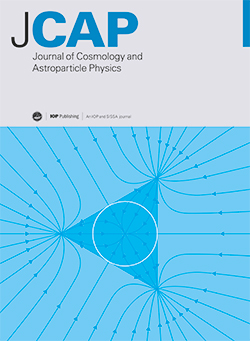暗物质(吃)年轻行星
IF 5.3
2区 物理与天体物理
Q1 ASTRONOMY & ASTROPHYSICS
Journal of Cosmology and Astroparticle Physics
Pub Date : 2024-11-26
DOI:10.1088/1475-7516/2024/11/046
引用次数: 0
摘要
我们研究了暗物质湮灭对木卫一行星形成的影响。我们的研究表明,暗物质的热注入可以减缓或停止开尔文-赫尔姆霍兹收缩,阻止氢和氦向固体内核的增殖。因此,太阳系中木星的存在可以用来推断暗物质相对较强的相互作用截面的约束条件。我们推导出了自旋相关暗物质和自旋无关暗物质截面的新约束。我们强调了利用未来的 JWST 观测进行正面探测的可能性,这可能会揭示出银河中心附近强烈变化的行星形态。本文章由计算机程序翻译,如有差异,请以英文原文为准。
Dark matter (h)eats young planets
We study the effect of dark matter annihilation on the formation of Jovian planets. We show that dark matter heat injections can slow or halt Kelvin-Helmholtz contraction, preventing the accretion of hydrogen and helium onto the solid core. The existence of Jupiter in our solar system can therefore be used to infer constraints on dark matter with relatively strong interaction cross sections. We derive novel constraints on the cross section for both spin-dependent and spin-independent dark matter. We highlight the possibility of a positive detection using future observations by JWST, which could reveal strongly varying planet morpholoiges close to our Galactic Center.
求助全文
通过发布文献求助,成功后即可免费获取论文全文。
去求助
来源期刊

Journal of Cosmology and Astroparticle Physics
地学天文-天文与天体物理
CiteScore
10.20
自引率
23.40%
发文量
632
审稿时长
1 months
期刊介绍:
Journal of Cosmology and Astroparticle Physics (JCAP) encompasses theoretical, observational and experimental areas as well as computation and simulation. The journal covers the latest developments in the theory of all fundamental interactions and their cosmological implications (e.g. M-theory and cosmology, brane cosmology). JCAP''s coverage also includes topics such as formation, dynamics and clustering of galaxies, pre-galactic star formation, x-ray astronomy, radio astronomy, gravitational lensing, active galactic nuclei, intergalactic and interstellar matter.
 求助内容:
求助内容: 应助结果提醒方式:
应助结果提醒方式:


